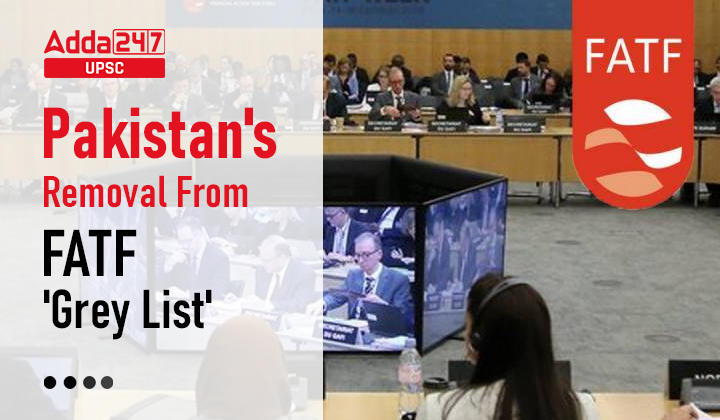Table of Contents
Pakistan’s Removal From FATF ‘Grey List’: Relevance for UPSC
GS 2 & GS 3: Money Laundering, Terrorism in Hinterland & Border Areas, Groupings & Agreements Involving India and/or Affecting India’s Interests, India and its Neighbourhood
Pakistan’s Removal From FATF ‘Grey List’: Why in news?
- The global money laundering and financing watchdog on October 21, 2022 removed Pakistan from its list of countries under “increased monitoring” after four years.
Pakistan’s Removal From FATF ‘Grey List’: Background
- Pakistan has been on the “grey list” of the Financial Action Task Force (FATF) since 2018 because of “strategic counter-terrorist financing-related deficiencies”.
- Pakistan’s removal from the list was announced after a consensus decision of all 39-members, including India to accept the review of Pakistan’s efforts on strengthening its anti money laundering and combating terror financing (AML/CFT) mechanisms.
Pakistan’s Removal From FATF ‘Grey List’: What is Financial Action Task Force (FATF)?
- The FATF is an inter-governmental body that sets international standards seeking to prevent international financial crimes that aid terrorism.
- The FATF was established in July 1989 by a G-7 Summit in Paris, initially to examine and develop measures to combat money laundering.
- After the 9/11 attacks, the FATF in October 2001 expanded its mandate to incorporate efforts to combat terrorist financing.
- In April 2012, it added efforts to counter the financing of proliferation of weapons of mass destruction.
- The FATF has developed the FATF Recommendations, or FATF Standards, which ensure a co-ordinated global response to prevent organised crime, corruption and terrorism.
Pakistan’s Removal From FATF ‘Grey List’: What is the FATF’s grey list?
- FATF maintains a “grey list” of countries that it watches closely.
- In essence, these are countries that have, in the assessment of the FATF, failed to prevent international money laundering and terrorist financing, and are, therefore, on a global watchlist for bad behaviour.
- Until October 21st, Pakistan was the most important country on the list. After it (along with Nicaragua) was taken off the list, 23 countries remain under watch.
- Among these countries are the Philippines, Syria, Yemen, the United Arab Emirates, Uganda, Morocco, Jamaica, Cambodia, Burkina Faso, and South Sudan, and the tax havens of Barbados, Cayman Islands, and Panama.
Pakistan’s Removal From FATF ‘Grey List’: What were key action plan tasks?
- Among the action plan tasks were that Pakistan align its laws to international laws on AML/CFT and pursue UNSC banned terrorists, including the prosecution of a number of terror groups and leaders including the Lashkar e Toiba’s (LeT’s) Hafiz Saeed, 26/11 handler Sajid Mir, commander Zaki Ur Rahman Lakhvi and others.
- While Pakistan failed to imprison Jaish e Mohammad Chief Masood Azhar, authorities pursued cases against him, declaring him “missing”.
Financial Action Task Force (FATF): Composition, Functions, and Its Fight against Terror Financing
Pakistan’s Removal From FATF ‘Grey List’: What is APG (Asia/Pacific Group on Money Laundering)?
- In 1995 an Asia-Pacific regional office called the “FATF-Asia Secretariat” was established and funded by government of Australia.
- In cooperation with other international bodies, that secretariat worked with countries in the Asia-Pacific to generate wide regional commitment to implement anti-money laundering policies and initiatives and secure agreement to establish a more permanent regional anti-money laundering body.
- The Asia/Pacific Group on Money Laundering is an inter-governmental organisation, consisting of 41 member jurisdictions.
- The objective of the APG is to ensure that individual members effectively implement the international standards against money laundering, terrorist financing and proliferation financing related to weapons of mass destruction.
Pakistan’s Removal From FATF ‘Grey List’: What if FATF blacklists a nation?
- Pakistan was listed in 2018 because of “strategic counter-terrorist financing-related deficiencies”.
- A further FATF blacklist meant the country concerned is “non-cooperative” in the global fight against money laundering and terrorist financing.
- If the FATF blacklists any nation, it may lead to downgrading of the country by lenders like International Monetary Fund, World Bank, Asian Development Bank and European Union.
Pakistan’s Removal From FATF ‘Grey List’: Way Forward
- As a result of FATF scrutiny, Pakistan has been forced to take some action against well-known terrorists, including those involved in attacks against the entire international community in Mumbai on 26/11,” India’s Foreign Ministry spokesperson Arindam Bagchi said in a statement.
- It is in global interest that the world remains clear that Pakistan must continue to take credible, verifiable, irreversible and sustained action against terrorism and terrorist financing emanating from territories under its control.



 TSPSC Group 1 Question Paper 2024, Downl...
TSPSC Group 1 Question Paper 2024, Downl...
 TSPSC Group 1 Answer key 2024 Out, Downl...
TSPSC Group 1 Answer key 2024 Out, Downl...
 UPSC Prelims 2024 Question Paper, Downlo...
UPSC Prelims 2024 Question Paper, Downlo...




